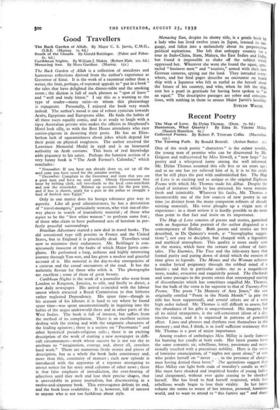Good Travellers
The Back Garden of Allah. By Major C. S. Jarvis, C.M.G., O.B.E. (Murray. 78. 6c1.)
The Back Garden of Allah is a collection of anecdotes and humorous reflections derived from the author's experience as Governor of Sinai. It is the work of a raconteur rather than a writer, the fruit, perhaps, of repeated appeals to " put in a book " the tales that have delighted the dinner-table and the smoking room ; the diction is full of such phrases as " spot of leave " and " well and truly bitten." I say this as a warning to the type of reader—many exist—to whom this phraseology is repugnant. Personally, I enjoyed the book very much indeed. The author's mood is one of robust cynicism towards Arabs, Egyptians and Europeans alike. He finds the habits of all three races equally comic, and is as ready to laugh with a tipsy Australian private who makes the officers in Shepheard's Hotel look silly, as with the Rest House attendants who race carrier-pigeons in deserting their posts. He has an Eliza- bethan lack of squeamishness about jokes which depend for their point on physical roughness. The author received the Lawrence Memorial Medal in 1938 and is an honoured authority on Arab customs: This basis of real knowledge adds piquancy to his satire. Perhaps the funniest section of a very funny book is " The Arab Farmer's Calendar," which concludes: " November: If you have not already done so, eat up all the seed corn you have saved for the autumn sowing. " December: Complain to the Governor and state that you are a poor man and have no seed corn. Obtain Government free issue by bribing clerk, sell two-thirds to the local corn-merchant and sow the remainder. Balance up accounts for the past year, and if loss is shown, apply for a post in the police or smuggle a load of hashish into Egypt."
Only in one matter does his benign tolerance give way to asperity. Like all good administrators, he has a detestation of " travel-mongers," particularly women, who visit out-of-the- way places in search of journalistic material ; of those who aspire to be the " first white woman " to perform some feat ; of those who claim to have performed acts of heroism in per- fectly peaceful surroundings.
Brazilian Adventure started a new deal in travel books. The old sensational type still persists in France and the United States, but in England it is practically dead. Travellers tend now to minimise their endurances. Mr. Reitlinger is con- spicuously innocent of the faults of which Major Jarvis com- plains. He performed a long, arduous and highly interesting journey through Yun-nan, and has given a modest and graceful account of it. His material is the day-to-day emergencies of a caravan and the casual encounters of the road. It has the authentic flavour for those who relish it. The photographs are excellent ; some of them of great beauty.
Caribbean Nights is the work of a journalist who went from London to Kingston, Jamaica, to edit, and finally to direct, a new daily newspaper. His arrival coincided with the labour unrest which attracted a Royal Commission to that hitherto rather neglected Dependency. His spare time—though in his account of his labours it is hard to see where he found spare time—was spent unconventionally in inquiring into the habits of the negro underworld there and in other parts of the West Indies. The book is full of interest, but suffers from the method of its compilation. There is an excellent section dealing with the rioting and with the enigmatic characters of the leading agitators ; there is a section on " Pocomania " and other hysterical pseudo-religious cults ; there is an exciting description of the work of starting a new newspaper in diffi- cult circumstances—work whose success he is not too shy to attribute to " imagination, courage and, above all, ceaseless hard work." There are numerous lively stories and pieces of description, but as a whole the book lacks consistency and, more than this, continuity of manner ; each new episode is introduced with the apparatus of a reporter attempting to attract notice for his story amid columns of other news ; there is that false emphasis of introduction, the over-heating of adjectives until they melt and lose their precise shapes, that is unavoidable in penny journalism, but disconcerting in a twelve-and-sixpenny book. This extravagance defeats its end, and the book loses readability. It is, however, full of interest to anyone who is not too fastidious about style. Menacing Sun, despite its showy title, is a gentle book by a lady who has lived twelve years in Japan, learned its Ian_ guage, and fallen into a melancholy about its preposterous political aspirations. She left that unhappy country for a tour in Indo-China, Siam, Malaya, the East Indies and India, but found it impossible to shake off the subject which oppressed her. Wherever she went she found the squat, spec- tacled " business men " and " tourists," armed with their new German cameras, spying out the land. They intruded every- where, and her final pages describe an encounter on board ship with a Japanese who felt as rueful as she herself about the future of his country, and who, when he left the ship, sent her a pearl in gratitude for having been spoken to "as an equal." The descriptive passages are sober and conscien- tious, with nothing in them to arouse Major Jarvis's hostility.
EVELYN WAUGH.








































 Previous page
Previous page